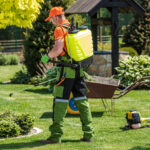Don’t be fooled: Bayer’s new Roundup weedkillers are more toxic than ever before
 (NaturalHealth365) It is no secret that glyphosate is one of the most toxic chemicals you can be unwittingly exposed to in your daily life. From the food you eat to the landscaping you traverse, Roundup weed killer is used in big cities and rural agriculture and is, therefore, nearly inescapable.
(NaturalHealth365) It is no secret that glyphosate is one of the most toxic chemicals you can be unwittingly exposed to in your daily life. From the food you eat to the landscaping you traverse, Roundup weed killer is used in big cities and rural agriculture and is, therefore, nearly inescapable.
Because of thousands of lawsuits linking lymphoma to glyphosate exposure, Bayer has reformulated Roundup to “make it safer.” Studies have shown, however, that not only does Roundup still contain glyphosate, but it now includes dozens of other more harmful, more persistent chemicals.
Bayer and other massive companies will always put profits over people, but let’s look at what this means and how you can protect your family naturally and avoid these toxins as much as possible.
Hidden dangers: Why reformulated Roundup may be more dangerous than ever
The new Roundup chemical formulations aren’t just bad for you – they’re potentially more dangerous than their predecessors for several critical reasons.
First, a dangerous loophole in EPA regulations allows companies to make vague, unsubstantiated claims on their packaging. Just as food manufacturers can slap “heart healthy” on products simply because they contain oats, Bayer can market Roundup as “safer” without meaningful oversight. This misleading labeling often leads consumers to lower their guard and apply the product more liberally, increasing their exposure to these harmful chemicals.
The new formula introduces four chemicals that are particularly concerning: diquat dibromide, fluazifop-P-butyl, triclopyr, and imazapyr. According to the United States Environmental Protection Agency (EPA), each of these poses a greater risk of reproductive damage than glyphosate, with more severe long-term health effects. Whether the EPA previously downplayed glyphosate’s dangers or whether these new chemicals are genuinely more harmful remains unclear, but neither scenario is reassuring.
Most alarming is diquat dibromide, which appears in all new Roundup formulations despite being banned in the European Union. This chemical is 200 times more toxic than glyphosate during long-term exposure. Combined with the other new additions, these chemicals create a more persistent environmental threat:
- They linger longer in soil and groundwater than glyphosate
- They frequently pass through water treatment facilities unchanged
- They accumulate in game animals like deer, birds, and fish
- They ultimately find their way onto your dinner plate through multiple exposure paths
The result? A more widespread, long-lasting toxic presence that’s harder to avoid than ever before.
How to protect your family from Roundup
There’s no doubt that Roundup is all around us at this point – Bayer has a near monopoly on large-scale agriculture, and it’s easy to use. It’s used in commercial landscaping, and many residential homeowners also use it. It’s entrenched in the food system and physically all around us, so what can you do to avoid this toxic concoction?
The first step is to avoid it in your food, and this means learning where your food comes from by buying locally, organically grown produce. Talk to local farmers and co-ops, learn their growing practices, and buy accordingly.
If you can’t buy locally, get organic food at your grocer. It’s more expensive, but it’s better for you in the long run.
The next thing you can do is find out the landscaping practices of the places you frequently go to – church, school, and work – and see if they use Roundup. If they do, educating them on the dangers and alternatives can be a huge step in harm reduction for you, your neighbors, and those working in those areas.
Lobby your local political leaders to get to the EPA on behalf of their constituents to increase safety standards to at least the EU level, banning these toxic chemicals for good. You and your friends and family can also petition the EPA directly; more voices mean a louder, undeniable chorus against these poisons.
You CAN protect yourself from an increasingly toxic world; it just takes being informed and diligent. Learn all about these dangers and inform your friends, family, and neighbors. We can take back our food and living system; it just takes effort and solidarity.
Sources for this article include:



